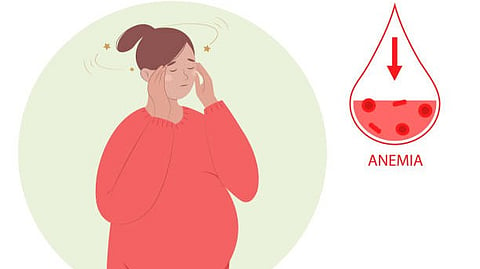

Giving free prenatal iron supplements to medically underserved pregnant patients rather than only recommending them significantly reduced anemia and postpartum blood transfusions, researchers at UT Southwestern Medical Center and Parkland Health report in a study published in JAMA Network Open.
“Anemia during pregnancy and the postpartum period can lead to severe health complications. We now have data supporting ways to prevent postpartum anemia on a population level by ensuring normal blood volume during delivery, reducing the need for transfusions, and positively impacting the health of mothers and their newborns,” said Catherine Spong, M.D., Chair and Professor of Obstetrics and Gynecology. Dr. Spong co-led the study with Lisa Thiele, M.D., M.P.H., an Obstetrics and Gynecology resident at UT Southwestern.
Research shows pregnant women experience a 15%-20% increase in blood volume and require additional iron to make sufficient hemoglobin, a protein in red blood cells that carries oxygen through the body. Anemia occurs when there are insufficient healthy red blood cells. According to the Centers for Disease Control and Prevention, anemia in pregnancy is linked to adverse health outcomes for mothers and newborns, including blood transfusion, postpartum anemia and depression, premature birth, low birth weight, and perinatal mortality.
Obstetricians routinely recommend iron supplements in pregnancy for anemia prevention. But in 2015, iron was reclassified as a nutritional supplement and no longer covered by insurance as a medicine, leaving many low-income pregnant patients without access to these supplements. While doctors continue to recommend them, Drs. Spong and Thiele and their colleagues tested whether providing free supplements at prenatal visits would improve outcomes.
The team analyzed deliveries at Parkland Memorial Hospital, which is the primary teaching hospital for UT Southwestern and has one of the busiest maternity wards in the country, providing care to patients with fewer socioeconomic resources. One group consisted of 7,075 patients who delivered between January and August 2019 and had received recommendations to take prenatal iron supplements. The second included 7,160 patients who delivered between May and December 2020 and received free supplements with iron throughout their pregnancy.
Researchers assessed hematocrit levels in both groups at 24 to 32 weeks, upon admission for delivery, before discharge, and during postpartum follow-up. Hematocrit, which reflects the percentage of blood volume composed of red cells, is a standard measurement for prenatal and postpartum anemia.
They found the patients who received iron supplements had consistently higher hematocrit levels at each assessment period compared with patients who received only a recommendation to take them. Notably, maternal anemia at admission was 7% lower among patients provided supplements. Additionally, transfusions for acute blood loss anemia not related to obstetric catastrophe occurred in 46 deliveries among the group receiving supplements compared with 71 among those who received the recommendation to take iron.
Dr. Thiele, recipient of the Southwestern Gynecologic Assembly Award, said the findings provide a method for reducing patients’ barriers to access, helping lead to tangible clinical outcomes.
“We can make a large impact on our patients’ health and outcomes by implementing simple interventions,” Dr. Spong said. “This study demonstrates the efficacy of a public health initiative to reduce maternal anemia and the most common cause of severe maternal morbidity and gives other institutions data to implement similar programs in their own populations.”
For its findings, the team received the Society of Maternal-Fetal Medicine’s Disparities Award for Best Research on Diversity/Disparity in Health Outcomes.
This research was supported by the Parkland Community Health Plan.
Other UTSW researchers in the Obstetrics and Gynecology Department who contributed to this study were David B. Nelson, M.D., Associate Professor and Division Chief of Maternal-Fetal Medicine; Donald McIntire, Ph.D., Professor; and Elaine Duryea, M.D., Associate Professor. Carrie Berge, Pharm.D., Vice President of Pharmacy Services at Parkland Health, also contributed.
Dr. Spong holds the Paul C. MacDonald Distinguished Chair in Obstetrics and Gynecology. Dr. Nelson holds the Gillette Professorship of Obstetrics and Gynecology and is a Dedman Family Scholar in Clinical Care (Newswise/ DPK)
